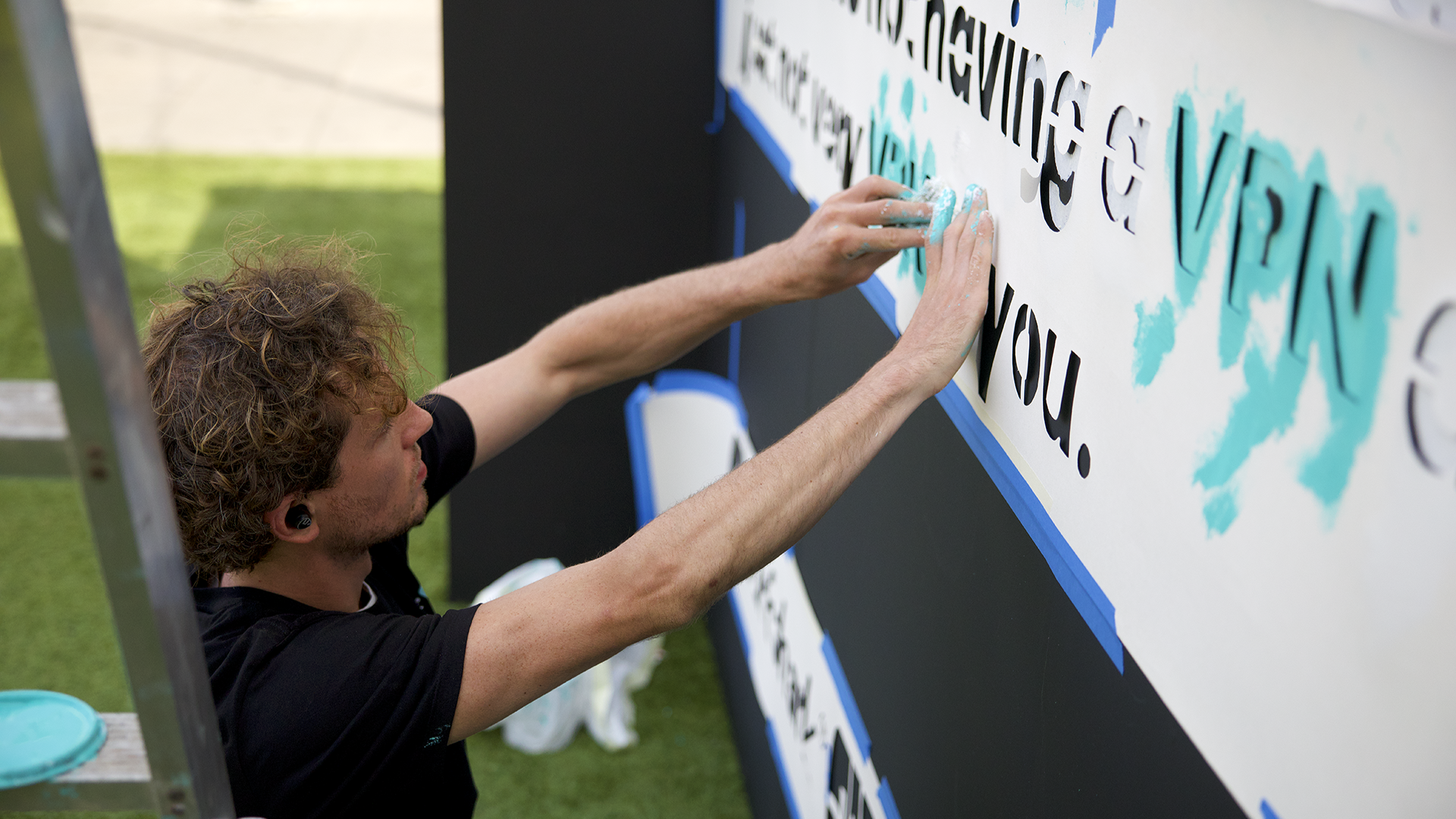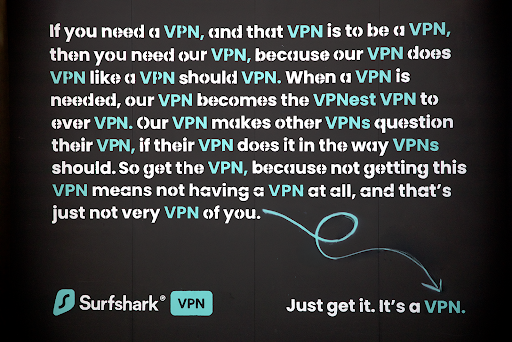Surfshark sent a graffiti artist to Shoreditch to teach you about the absurd simplicity of VPNs
Surfshark has teamed up with graffiti artist KingMurals to boost VPN awareness with an extravagant live stunt in Shoreditch

If you – like many of us – have found yourself pondering whether to adopt a VPN lately, a visit to London’s Shoreditch on August 20 might well have cleared things up for you, once and for all.
Strolling around BoxPark that day, you might have stumbled upon legendary local street artist KingMurals, hard at work painting a live mural in front of a curious crowd of lookers and passers-by. Armed with buckets of paint and stencils in hand, the street artist rendered a rather bizarre but definitive response to all of your VPN-related conundrums.
At first glance, the mural’s mix of repetitive, philosophical passages might have looked confusing – a cross between Shakespearean-hipster poetry and a wacky ad campaign for the latest lifestyle brand. Except for one rather conspicuous detail: the term VPN recurring exactly twenty-three times in bold, turquoise – as noun, adjective, and verb.
"When a VPN is needed, our VPN becomes the VPNest VPN to ever VPN," proclaims one of the absurd, whimsical passages on the giant wall. After lines of surreal chatter, the graffiti, however, reaches an unequivocal conclusion: "Just get it. It’s a VPN."
The stunt marks the latest campaign from Surfshark, one of the best VPN services according to TechRadar's reviewers. This time, the cybersecurity company’s position is crystal-clear – VPNs are no longer just a tech tool, they are a lifestyle. You run, you cook, and you VPN too. It doesn't matter what the VPN does, as long as it does it. And well, forget the details too – just "VPN."
Data privacy tools must be foolishly crystal-clear

Surfshark's latest initiative seeks to expose an industry that too often discourages users with overwhelmingly technical hype, blurring obvious decisions – namely, to protect your digital identity or not – that should be purely straightforward instead.
"By making the message playful and absurdly simple, we’re highlighting that a VPN should just do its job without overcomplicating things," explains the Chief Marketing Officer at Surfshark, Regimantas Urbanas. "It’s important that our customers understand not just how things work, but why they matter."
While it’s common for cybersecurity products to routinely fall into the trap of technical jargon, Urbanas notes that in user interviews conducted by Surfshark, consumers regularly claim simplicity is a top priority when navigating the world of VPNs, demanding intuitive app designs and clear and concise language on the website.
During the campaign, a Surfshark host injected more trivial humour into the proceedings, engaging passers-by with quizzical ruminations on VPNs that had them comparing VPNs to ponies, sharks, or oddly-shaped sounds. Shoreditch provided "the perfect environment" for the exclusive unconventional approach, and KingMurals’ stunt was the glue that "brought the creative energy to life," Urbanas says.
This isn't the first time Surfshark has stirred public attention with thought-provoking marketing campaigns. A 2.5-meter bright pink pipe leaking green slime outside the 'Big Five' offices in Munich, or the infamous transparent mobile toilet that visited several areas in London, also urged people to reconsider their digital lifestyle choices.
However, the latest stunt reflects a shift in direction. The firm is now leaning into the importance of making VPN accessible and reliable, stressing that VPNs must now be looked at as an everyday essential.
The move follows a sharp increase in VPN usage since mandatory age verification controls came into force in the UK and a growing awareness among users of the benefits of using a VPN.
"New regulations definitely have an effect on VPN awareness, especially when they spark conversations about their implications for privacy and cybersecurity," explains Urbanas.
Whether the campaign has drilled that home is up to the audience to decide. However, one thing appears certain, at least according to the cybersecurity company: not using a VPN is becoming less of a viable option. And Surfshark is sure that it is they who have the obvious answer.
You might also like

Silvia Iacovcich is a tech journalist with over five years of experience in the field, including AI, cybersecurity, and fintech. She has written for various publications focusing on the evolving regulatory landscape of AI, digital behavior, web3, and blockchain, as well as social media privacy and security regulations.
You must confirm your public display name before commenting
Please logout and then login again, you will then be prompted to enter your display name.
